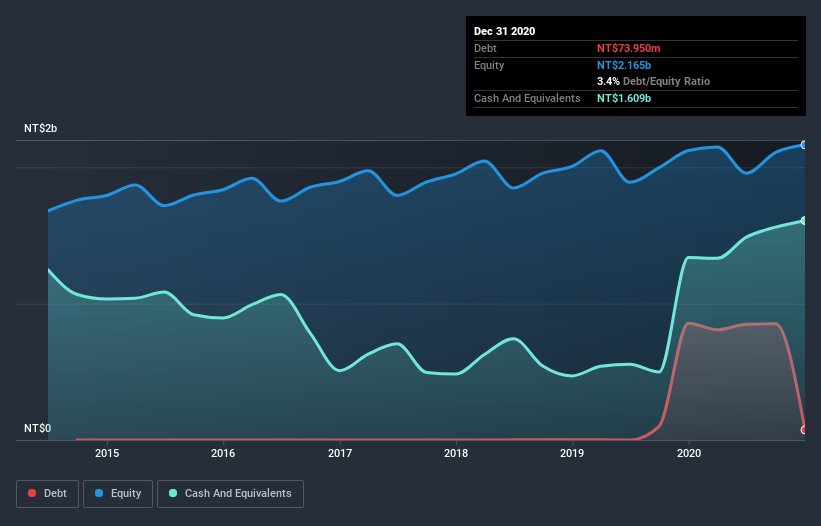Warren Buffett famously said, 'Volatility is far from synonymous with risk.' It's only natural to consider a company's balance sheet when you examine how risky it is, since debt is often involved when a business collapses. We note that TTFB Company Limited (GTSM:2729) does have debt on its balance sheet. But the more important question is: how much risk is that debt creating?
What Risk Does Debt Bring?
Debt assists a business until the business has trouble paying it off, either with new capital or with free cash flow. In the worst case scenario, a company can go bankrupt if it cannot pay its creditors. However, a more common (but still painful) scenario is that it has to raise new equity capital at a low price, thus permanently diluting shareholders. By replacing dilution, though, debt can be an extremely good tool for businesses that need capital to invest in growth at high rates of return. When we think about a company's use of debt, we first look at cash and debt together.
See our latest analysis for TTFB
What Is TTFB's Debt?
You can click the graphic below for the historical numbers, but it shows that TTFB had NT$74.0m of debt in December 2020, down from NT$856.8m, one year before. But it also has NT$1.61b in cash to offset that, meaning it has NT$1.53b net cash.

A Look At TTFB's Liabilities
We can see from the most recent balance sheet that TTFB had liabilities of NT$1.92b falling due within a year, and liabilities of NT$1.58b due beyond that. On the other hand, it had cash of NT$1.61b and NT$276.0m worth of receivables due within a year. So its liabilities outweigh the sum of its cash and (near-term) receivables by NT$1.62b.
While this might seem like a lot, it is not so bad since TTFB has a market capitalization of NT$5.85b, and so it could probably strengthen its balance sheet by raising capital if it needed to. But it's clear that we should definitely closely examine whether it can manage its debt without dilution. Despite its noteworthy liabilities, TTFB boasts net cash, so it's fair to say it does not have a heavy debt load!
The good news is that TTFB has increased its EBIT by 4.3% over twelve months, which should ease any concerns about debt repayment. When analysing debt levels, the balance sheet is the obvious place to start. But you can't view debt in total isolation; since TTFB will need earnings to service that debt. So if you're keen to discover more about its earnings, it might be worth checking out this graph of its long term earnings trend.
But our final consideration is also important, because a company cannot pay debt with paper profits; it needs cold hard cash. While TTFB has net cash on its balance sheet, it's still worth taking a look at its ability to convert earnings before interest and tax (EBIT) to free cash flow, to help us understand how quickly it is building (or eroding) that cash balance. Over the last three years, TTFB actually produced more free cash flow than EBIT. That sort of strong cash generation warms our hearts like a puppy in a bumblebee suit.
Summing up
While TTFB does have more liabilities than liquid assets, it also has net cash of NT$1.53b. And it impressed us with free cash flow of NT$966m, being 136% of its EBIT. So we don't think TTFB's use of debt is risky. When analysing debt levels, the balance sheet is the obvious place to start. However, not all investment risk resides within the balance sheet - far from it. For example - TTFB has 1 warning sign we think you should be aware of.
Of course, if you're the type of investor who prefers buying stocks without the burden of debt, then don't hesitate to discover our exclusive list of net cash growth stocks, today.
When trading TTFB or any other investment, use the platform considered by many to be the Professional's Gateway to the Worlds Market, Interactive Brokers. You get the lowest-cost* trading on stocks, options, futures, forex, bonds and funds worldwide from a single integrated account. Promoted
Valuation is complex, but we're here to simplify it.
Discover if TTFB might be undervalued or overvalued with our detailed analysis, featuring fair value estimates, potential risks, dividends, insider trades, and its financial condition.
Access Free AnalysisThis article by Simply Wall St is general in nature. It does not constitute a recommendation to buy or sell any stock, and does not take account of your objectives, or your financial situation. We aim to bring you long-term focused analysis driven by fundamental data. Note that our analysis may not factor in the latest price-sensitive company announcements or qualitative material. Simply Wall St has no position in any stocks mentioned.
*Interactive Brokers Rated Lowest Cost Broker by StockBrokers.com Annual Online Review 2020
Have feedback on this article? Concerned about the content? Get in touch with us directly. Alternatively, email editorial-team (at) simplywallst.com.
About TPEX:2729
TTFB
Engages in chain catering businesses in Taiwan, Shanghai, and Suzhou.
Adequate balance sheet second-rate dividend payer.
Market Insights
Weekly Picks

Solutions by stc: 34% Upside in Saudi's Digital Transformation Leader


The AI Infrastructure Giant Grows Into Its Valuation
Recently Updated Narratives


The "Sleeping Giant" Wakes Up – Efficiency & Monetization


The "Rate Cut" Supercycle Winner – Profitable & Accelerating


The Industrialist of the Skies – Scaling with "Automotive DNA
Popular Narratives


MicroVision will explode future revenue by 380.37% with a vision towards success


NVDA: Expanding AI Demand Will Drive Major Data Center Investments Through 2026



